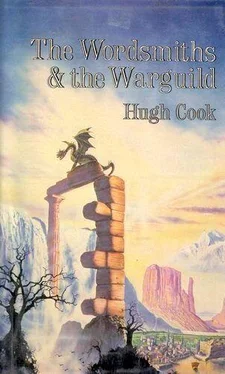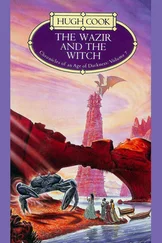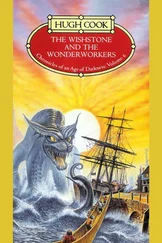Hugh Cook - The Wordsmiths and the Warguild
Здесь есть возможность читать онлайн «Hugh Cook - The Wordsmiths and the Warguild» весь текст электронной книги совершенно бесплатно (целиком полную версию без сокращений). В некоторых случаях можно слушать аудио, скачать через торрент в формате fb2 и присутствует краткое содержание. Жанр: Фэнтези, на английском языке. Описание произведения, (предисловие) а так же отзывы посетителей доступны на портале библиотеки ЛибКат.
- Название:The Wordsmiths and the Warguild
- Автор:
- Жанр:
- Год:неизвестен
- ISBN:нет данных
- Рейтинг книги:4 / 5. Голосов: 1
-
Избранное:Добавить в избранное
- Отзывы:
-
Ваша оценка:
- 80
- 1
- 2
- 3
- 4
- 5
The Wordsmiths and the Warguild: краткое содержание, описание и аннотация
Предлагаем к чтению аннотацию, описание, краткое содержание или предисловие (зависит от того, что написал сам автор книги «The Wordsmiths and the Warguild»). Если вы не нашли необходимую информацию о книге — напишите в комментариях, мы постараемся отыскать её.
The Wordsmiths and the Warguild — читать онлайн бесплатно полную книгу (весь текст) целиком
Ниже представлен текст книги, разбитый по страницам. Система сохранения места последней прочитанной страницы, позволяет с удобством читать онлайн бесплатно книгу «The Wordsmiths and the Warguild», без необходимости каждый раз заново искать на чём Вы остановились. Поставьте закладку, и сможете в любой момент перейти на страницу, на которой закончили чтение.
Интервал:
Закладка:
"Stop that!" shouted Togura.
One of the boys hauled the quadriplegic frog out of the earth and threw it slap-bang! into Namaji's face. She began to cry. Togura, to his shame, retreated. What else could he have done? He could think of nothing, short of breaking a few skulls, which would not have endeared him to the parents.
He began to contemplate suicide.
The summer days shortened to autumn. Togura thought of several ways of killing himself, but could not bring himself to take the final step. Planning suicide, in fact, made life easier, for at least it gave him a hobby of sorts.
One autumn afternoon, while helping the women to make felt from horse hair, Togura realised it was now two years since he had left Keep, that friendly, familiar mining town far away in the land of Sung where, according to his memories, he had been very happy. His beard was stronger now, a hairy little tuft at his chin, which he did not trim.
Winter came, and, for him at least, it was a bitter season. His growing competence with the triple-harp was no consolation. He found out how to use its twelve multicoloured buttons to sustain chords, to raise and lower the volume, to add vibrato, or to generate percussion, woodwind or brasswind effects. But music could not make him a man. It could only make him a more competent woman.
At mid-winter, he got a real shock to his system when he was made to tend the fire in a hut where a woman was in labour. Right from the start, he felt uneasy, feeling he should not be there – but the women, delighting in his embarrassment, forced him to stay. The labour lasted a day and a night. No man visited the woman in question; it was Togura's impression that the men of the village shunned all contact with pregnant women.
The birth itself terrified him. So much pain! So much blood! And the child, when it was born, so ugly! Covered with blood and mucus and something that looked like a layer of white fat, and might well have been. And the mother took that horrible disgusting slime-covered animal to her breast, and smiled as it suckled. And then, when he thought it was all over, something obscene happened. A great lump of the woman's guts followed the baby out of her body! Togura vomited, straight into the fire, there being no other place available; realising the cause of his distress, all the women howled with laughter.
The birth, from their point of view, was a victory.
The female who had given birth was up and about the very next day, apparently none the worse for losing a great big chunk of her guts. But Togura did not get over it for days. Though he was a country boy, he had never done farm work; he had never seen an animal give birth, let alone a human being.
And, while he had always known, vaguely, that a baby grows in its mother's belly, he had never thought about where it comes out, and had never been told. At an early age, his father had instructed him on how a man impregnates a woman; that stage he found intensely interesting, but he had never troubled himself much about what comes afterwards, having no curiosity about the private mysteries of women.
Now that he knew the truth, it quite put him off the thought of sex. For practical purposes, that made no difference one way or the other; however, considering his sensitivities, it was probably just as well that he had not yet had a chance to learn about menstruation, as that might have quite blighted his steadily developing romance with Namaji.
Chapter 30
In spring, the men daubed themselves with clay, as had the frog-hunting boys of the previous summer, then rode off to take a slap at someone beyond the horizon. They came back a few days later, some wounded, a few missing, and one, slung over the back of a horse, most definitely dead. The men had a roistering feast; as part of their celebration, they honoured their dead comrade by eating him.
As a great concession, even Togura was honoured with a bit of human flesh, which, over-roasted, tasted mostly of charcoal. He ate it eagerly, for it gave him at least a momentary association with the world of men, which is the world of swordblade legends and conquering heroes; Togura was living in the world of women, and he hated it.
The human flesh concession was a once-only indulgence. It changed nothing. Togura, in the eyes of the men, was a nominal woman, which made him almost invisible. They might give him a kick if he got in the way, or get rid of a bit of rubbish by throwing it at him, but generally they scarcely seemed aware that he existed, except when they came to have their hair cut. He had no knife, his blades having been confiscated long ago, so the men provided their own. Often he was tempted to cut a throat or two, but never managed to nerve himself to the act.
Togura did not know it, but his readiness to cut hair had lowered his status to about that of a dog. In terms of the local religion, hair, once separated from the body, was regarded as a particularly unpleasant form of dead and death-inducing matter; Togura, as hairdresser, was ritually unclean. He had compounded his uncleanness by stockpiling a great heap of hair in the annexe in which he slept, intending one day to stuff a mattress with it. This stockpile was now the subject of many jokes which were, in the local context, obscene.
Namaji, however, did not mind. Namaji thought Togura was wonderful. Namaji longed for him. Namaji worshipped him. Togura, having outgrown his brief-lived horror of human flesh – he had by now convinced himself that the birth he had seen was a tragic medical freak, and that most babies probably exited to the outside world by way of a woman's naval – was once more being tormented by his unappeased lusts. Given half a chance, he would appease them with Namaji.
That spring, a stranger arrived, bearing a green bough, which was perhaps a sign of peace, for he was admitted, even though he was not of the village. He smelt differently. His hair was elaborately styled, tied into ornate knots in the front, plaited into three pigtails behind, in start contrast to the men of the village, many of whom, thanks to Togura Poulaan's latest contribution to the world of fashion, were wearing their hair shaven close to the skull in front, and wild and woolly behind. The lobes of the stranger's ears were tattooed with blue, black and red, which, for reasons unknown to Togura, made many of the women giggle.
After a day of public palaver, in which the stranger made several speeches which were very well received, the men of the village feted the stranger in the meeting hall. Togura was there, sitting on a three-legged stool just behind the headman, playing his triple-harp.
It was a wild night. The men got drunk on fermented mare's milk heavily laced with a juice extracted from a special kind of toadstool. This potentially lethal brew was forbidden to women, and to untouchables like Togura, so he could only watch, stone cold sober, while the men got legless to the tune of his music.
At the height of the festivities, when most of the men were flat on their backs, the visiting stranger suddenly drew a knife and advanced on the headman. Togura at first thought it was a joke. Then a warrior, staggering on uncertain legs, tried to intercept the stranger, and was stabbed with three swift, professional blows. Nobody else was fit to stand.
As the women screamed, Togura picked up his three-legged stool and hurled it at the stranger. It clipped him on the head. Momentarily stunned, he wavered. Togura closed with him. And down they went, fighting for control of the knife. The women started to shout, stamp and applaud.
"Don't just stand there!" yelled Togura. "Hit him!"
But nobody understood his Galish.
The stranger was a strong, tough, wiry warrior, experienced in battle. But he had drunk a little of the night's brew, so as to appear sociable. Togura had drunk nothing. He, too, was tough, strong and wiry, capable of spending entire days lugging around heavy pots of water, milking mares or making felt. He found a stranglehold, and made good use of it.
Читать дальшеИнтервал:
Закладка:
Похожие книги на «The Wordsmiths and the Warguild»
Представляем Вашему вниманию похожие книги на «The Wordsmiths and the Warguild» списком для выбора. Мы отобрали схожую по названию и смыслу литературу в надежде предоставить читателям больше вариантов отыскать новые, интересные, ещё непрочитанные произведения.
Обсуждение, отзывы о книге «The Wordsmiths and the Warguild» и просто собственные мнения читателей. Оставьте ваши комментарии, напишите, что Вы думаете о произведении, его смысле или главных героях. Укажите что конкретно понравилось, а что нет, и почему Вы так считаете.












